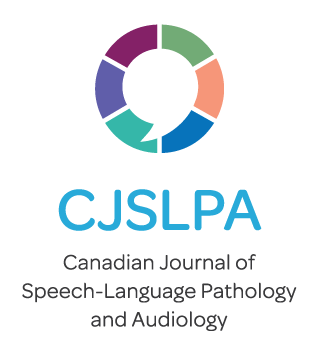

| Author(s) |
Vincent Bourassa Bédard Natacha Trudeau |
| Volume | 45 |
| Number | 1 |
| Year | 2021 |
| Page(s) | 15-28 |
| Language | French |
| Category | Research Article |
| Keywords |
Accès lexical Manque du mot Narration Évaluation Discours |
| Abstract |
For the past few years, research on word-finding difficulties has focused on picture naming, while word finding in discourse and the link between these two tasks has been neglected, especially for French-speaking children. Thus, speech-language pathologists working in French cannot rely on the frequency of word-finding behaviours, such as delays and repetitions, to correctly identify wordfinding difficulties in discourse. This pilot study aimed to (a) collect preliminary data on the frequency of word-finding behaviours in discourse and (b) determine if a relationship exists between the frequency of word-finding behaviours in discourse and picture naming task scores. Eleven typically developing French-speaking children (M = 7;07 years, SD = 0;10 years) told two stories and completed picture naming and word–picture matching tasks. The first story was produced following a story stem and the second from a picture from the Test of Narrative Language (Gillam & Pearson, 2004). To collect preliminary data, we used German’s analysis from the Test of Word Finding in Discourse (1991) to analyze the children’s language sample. Results suggest that using normative data from the Test of Word Finding in Discourse is problematic when assessing French-speaking children in narration. Moreover, picture naming and the frequency of word-finding characteristics in narration did not correlate significantly, suggesting that modifications to the Test of Word Finding in Discourse analysis may be needed for narration. We are conducting further studies with a larger sample including children with word-finding difficulties to determine the clinical and research utility of narration as part of a speech-language pathologist’s assessment of word finding. Au cours des dernières années, les recherches sur l’identification de difficultés d’accès lexical se sont principalement intéressées à la dénomination, délaissant le discours et le lien entre ces deux tâches, surtout pour les enfants francophones. L’absence de données sur les caractéristiques d’accès lexical attendues en discours chez les enfants francophones, telles que les pauses et les interjections, rend l’identification de difficultés d’accès lexical complexe pour les orthophonistes. Cette étude pilote visait (1) à recueillir des données préliminaires sur la fréquence des caractéristiques d’accès lexical en narration et (2) à déterminer s’il existe une relation entre cette variable et les résultats à une tâche de dénomination. Onze enfants unilingues francophones qui avaient un développement typique (M = 7;07 ans, ÉT = 0;10 ans) ont participé à deux tâches de narration, ainsi qu’à des tâches de dénomination et de désignation. Les participants ont généré une narration à partir d’une histoire à compléter, puis à partir d’une image tirée du Test of Narrative Language (Gillam et Pearson, 2004). L’analyse de German, tirée du Test of Word Finding in Discourse (1991), a été appliquée aux échantillons de langage en contexte narratif afin de récolter des données préliminaires. Les résultats suggèrent que l’utilisation des données normatives du Test of Word Finding in Discourse pour la population franco-québécoise est problématique en contexte de narration. De plus, aucune corrélation significative n’a été observée entre la dénomination et les caractéristiques d’accès lexical en narration, suggérant que l’analyse du Test of Word Finding in Discourse pourrait devoir être adaptée pour la narration. D’autres études sont en cours auprès d’un échantillon de plus grande taille et comprenant des enfants présentant des difficultés d’accès lexical afin de déterminer l’utilité en clinique et en recherche du contexte de narration dans l’évaluation de l’accès lexical. |
| Record ID | 1270 |
| Link | https://cjslpa.ca/files/2021_CJSLPA_Vol_45/No_1/CJSLPA_Vol_45_No_1_2021_1194.pdf |
CJSLPA is an open access journal which means that all articles are available on the Internet to all users immediately upon publication. Users are allowed to read, download, copy, distribute, print, search, or link to the full texts of the articles, or use them for any other lawful purpose.
CJSLPA does not charge authors publication or processing fees.
Copyright of the Canadian Journal of Speech-Language Pathology and Audiology is held by Speech-Language and Audiology Canada (SAC). Appropriate credit must be given (SAC, publication name, article title, volume number, issue number and page number[s]) but not in any way that suggests SAC endorses you or your use of the work. You may not use this work for commercial purposes. You may not alter, transform, or build upon this work.